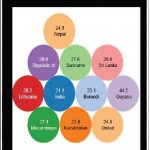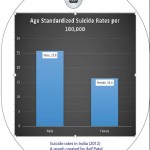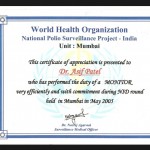16 Feb, 2012 | Author: Asif Patel | Comments Off on Mali, conflict and health implications…
Apparently peaceful looking Mali took me aback . I was just browsing Mali news and the conflict undergoing in northern Mali grabbed my attention and saddened me. Politics is at it’s place, ok, that’s not our cup of tea, but the thing which makes me most concerned is the health implication stemming from instability and fighting in the region. Thousands of Malians have already migrated to the neighboring countries, REFUGEES. It is going to add further burden on struggling economies of neighboring countries. We best know Kenya’s condition due to sudden influx of millions of Somalians. Let’s talk about health implications: children become the very first victim, due to lack of food, are highly prone to malnutrition. Malaria, cholera and other infectious diseases in overall population. Off course, mental health issues, like depression resulting from losing whatever had and blink future. Ultimately host country suffers too.
Category Uncategorized |
15 Feb, 2012 | Author: Asif Patel | Comments Off on Ghana- mental health illness still a stigma!
Stigma is a major impediment to the mental health care in Ghana.When a patient suffering from mental illness is rejected by families, government should embrace patients with open heart, not by words alone but with deeds.in Ghana, for the population of 24 million, there are only 12 psychiatrists. It is estimated that around ten percent population of Ghana suffers from mental health illness of sonme kind. To cater to their need, Government should spend seven percent of health care expenses on the mental health care. Mental health billis already in pipeline, and if passed, it could bring smiles on many mental health patients. Even bill is passed, enforcement would remain a big worry.
Category Uncategorized |
In partnership with Children’s Hospital Boston and the Skoll Global Threats Fund, the American Public Health Association has launched a unique online tracking tool called “Flu Near You” that directly engages the public in an effort to help address the annual public health challenge of influenza. Based on the HealthMap platform developed at Children’s Hospital Boston, Flu Near You maps influenza activity as volunteers self-report symptoms each week. As participation in the project grows and becomes widespread across the United States, the open system will give health practitioners and public health authorities responsible for responding to the flu a better grasp of the full breadth of the flu’s impact and spread.
“Current estimates of how many Americans suffer from the flu every year don’t come close to measuring its actual impact,” said John Brownstein, PhD, director of the Computational Epidemiology Group within the Informatics Program at Children’s Hospital Boston and co-founder of HealthMap. “Thousands, if not hundreds of thousands, of cases occur but we don’t know it because they are never reported. This tool can help inform a more comprehensive picture of real-time flu activity by mobilizing the public and affording them the opportunity to contribute their localized information for the benefit of the public as well as public health professionals tasked with tracking the disease.”
According to the Centers for Disease Control and Prevention, an average of 23,000 people in the U.S. die every year from the flu, but experts contend actual deaths could range from 33,000 to 49,000.
“Flu Near You can be an invaluable surveillance tool that all members of a community, including public health officials, can rely on to help track the spread of flu locally and across the country,” said Mark Smolinski, MD, MPH, Director for Global Health at the Skoll Global Threats Fund.
In recognition of National Influenza Vaccination Week, Dec. 4-10, APHA is calling on its member base of nearly 30,000 public health professionals from across the country to join the site and compete in a challenge to recruit as many people as possible to participate. Those who sign up as participants in Flu Near You are asked to report their flu symptoms, or lack thereof, through a weekly email survey that takes just a few seconds to complete.
“This is an incredibly exciting opportunity to bring the public into public health, and APHA is pleased to be a part of this important initiative,” said Susan Polan, PhD, associate executive director of APHA.
To more fully test the utility of the new surveillance tool, and since participation is anonymous by design, the Flu Near You partners have pledged to make the data the site collects open to all.
“APHA is well positioned to provide responsible messaging, leadership by example, and the ability to reach out to all sectors of society,” said Dr. Smolinski. “We are excited about partnering with APHA and building on HealthMap’s experience in participatory disease surveillance.”
HealthMap was launched five years ago as an outbreak surveillance system that offers a real-time view of emerging infectious disease threats around the world. For more information about HealthMap, visit http://healthmap.org.
For more about Flu Near You, visit www.flunearyou.org.
For more about APHA, visit www.apha.org.
Children’s Hospital Boston is home to the world’s largest research enterprise based at a pediatric medical center, where its discoveries have benefited both children and adults since 1869. More than 1,100 scientists, including nine members of the National Academy of Sciences, 11 members of the Institute of Medicine and nine members of the Howard Hughes Medical Institute comprise Children’s research community. Founded as a 20-bed hospital for children, Children’s Hospital Boston today is a 395 bed comprehensive center for pediatric and adolescent health care grounded in the values of excellence in patient care and sensitivity to the complex needs and diversity of children and families. Children’s also is the primary pediatric teaching affiliate of Harvard Medical School. For more information about research and clinical innovation at Children’s, visit: http://vectorblog.org.
The Skoll Global Threats Fund’s mission is to confront global threats imperiling humanity by seeking solutions, strengthening alliances, and spurring actions needed to safeguard the future. http://www.skollglobalthreats.org/.
Category Uncategorized |
Why Africa has poor health indices:
1) Political apathy and corruption
Cuba has proved that if you have political will, major haullment are possible in health sector. Politicians siphon off most of the aid receiving from global organizations. Due to lack of political will, they do not come up with any plan or idea neither do they support if any of them come up from different quarter.
2) Environmental and geographical factors: certain environmental conditions promote growth of bacteria and parasites.
3) lack of infrastructure: many African countries suffer from lack of adequate infrastructure to control infectious diseases.
4) Low literacy : literacy rate, especially among women is below 50%. It hampers awareness programs.
5) Poverty: poverty is one of the most important hundreds for better health.
All these factors are so interconnected, and in epidemiology language, I would call it social web of causation.
There is need of strong political will and honest politicians, other things will eventually improve with time.
One thing I pointed out that there is growing fashion among African leaders that they blame WEST for their miseries. But in my opinion, it is a defensive mechanism to cover up their own failures. Who else on the earth stopped leaders to formulate a plan for safe water in continent? Why leaders are not able to control hunger index in few countries like Zimbabwe despite of rich resources.
Hunger must be addressed through political change; political democratization, restrictions on arm trade, and the reduction of generalized violence.
Category Uncategorized |
While coming late by subway, I specially noticed homeless people sleeping in the train. This is not the first time I observed it. At least they are better placed than homeless people in Mumbai, where they take shelter beside railway tracks, dirty gutters and sometimes on the road. But one thing is common, poverty is the point where all lines join each other!
Agreed that few homeless are responsible for their own fate, but to me, most of them are victim of government neglection. I am not sure of the United States, especially NewYork, but I can tell something sure of India and especially Mumbai!
What can be done, what are the solutions? ” structured intervention”? Someone from philanthropists should take initiatives and should provide shelter to guenine needy!
Category Uncategorized |





